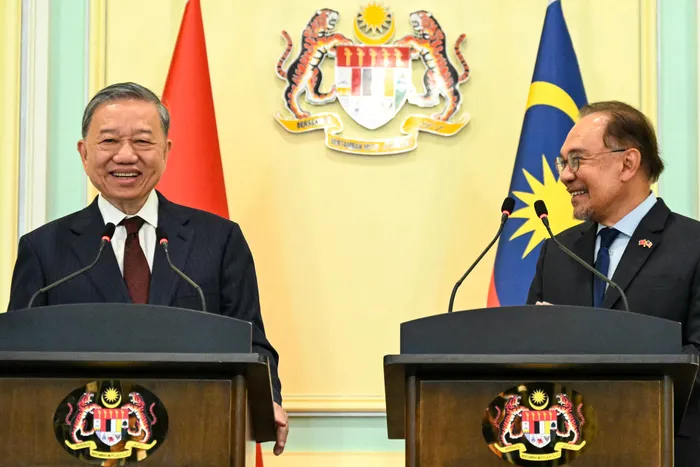BRICS+ Series: Malaysia and Vietnam to Deepen Tourism Ties

Malaysia's Prime Minister Anwar Ibrahim (R) and Vietnam's communist party general secretary To Lam (L) attend a press conference at the Federal Government office "Putra Perdana" in Putrajaya near Kuala Lumpur on November 21, 2024.
Image: AFP
Malaysia's tourism industry is experiencing a resurgence in the post-COVID era, primarily fueled by regional tourist demand and a burgeoning medical tourism sector. As a BRICS+ partner country, Malaysia is actively seeking to tap into new markets, exemplified by its recent tourism collaboration with Vietnam. This strategic partnership not only serves to bolster the tourism sectors of both nations but also advances the broader BRICS+ agenda of South-South cooperation.
Tourism as a pillar of the Malaysian Economy
Malaysia has been a booming tourist location in Southeast Asia for many years. Tourism ranks amongst the top sectors of the country, coming after manufacturing and commodities. Along with the rest of the world, the tourism sector suffered gravely as a result of the COVID-19 outbreak. Since then, Malaysia has made significant progress in boosting both domestic and international tourist arrivals. It is expected that the growth of the sector will continue to rise driven by ongoing consumer confidence and growing travel demands. As the sector expands, it positively contributes to the country’s economic development for foreign reserves and for the rising tourism expenditure.
Malaysia’s BRICS+ Momentum
Malaysia’s entry into BRICS+ as a partner country, opens new opportunities, including enhanced trade, diversified foreign direct investment (FDI), and stronger international influence benefiting the country’s economic portfolio. Kuala Lumpur has a greater platform in the international arena on partaking in global issues and therefore the country can have more influence and South-South cooperation to name a few. Malaysia widening its relationships with fellow global South countries strengthens the network of countries to foster mutual growth and development, and most importantly, legitimises the fight against hegemonic rhetoric which only benefits the minority of the globe.
Regional Tourism Trends
There has been an outstanding improvement by the government regarding industry. Between January to December 2024 the visitor arrivals increased by 8.3% reaching 37 961 485 compared to 2019. From these statistics, the top visiting arrivals into Malaysia were Singapore, Indonesia, China, Thailand, Brunei and India. The most notable growth of tourists in 2023/2024 from these countries was China with an increase of 130.9%, Brunei the second highest with 55.2% growth and third being Singapore with a growth rate of 27.2%. There is notable BRICS+ representation in these countries with three being BRICS members and Thailand being a BRICS+ partner country.
Malaysia's impressive growth in the tourism sector is unsurprising given its diverse offerings. The country boasts a rich cultural tapestry, evident in its cuisine, traditions, and festivals, influenced by its indigenous, Malay, Chinese, and Indian populations. Its natural beauty, from tropical islands to rainforests, is breathtaking. Modern and sustainable infrastructure ensures efficient transportation, and iconic landmarks like the Petronas Twin Towers — once the world's tallest buildings and currently the tallest twin structures — add to the allure. Malaysia is a haven for food and luxury enthusiasts, balancing deep-rooted cultural experiences with street food adventures and opulent indulgence. The country's medical tourism sector is also rapidly growing, attracting visitors with its affordable, high-quality healthcare, specialising in cardiology, fertility treatments, dentistry, and health screening, including wellness packages.
Medical Tourism Appeal
Malaysia has become a popular medical hub for patients from neighboring countries due to several factors. Citizens from Indonesia, Myanmar, Cambodia, the Philippines, and Vietnam often travel to Malaysia for specialised care and treatments that may not be available or are too expensive in their home countries. Even citizens from Singapore, which boasts world-class healthcare, seek more affordable dental and cosmetic treatments in Malaysia. Additionally, patients from Middle Eastern Gulf countries are drawn to Kuala Lumpur for Muslim-friendly services and Halal medical practices.
Malaysia's popularity is attributed to its proximity to neighboring countries with convenient flight times, cultural and religious familiarity, and medical packages tailored to ASEAN (Association of Southeast Asian Nations) and Middle Eastern patients. Partnerships with foreign governments and insurance providers and a growing middle class in many Southeast Asian countries have further contributed to Malaysia's appeal as a medical tourism destination.
Strengthening Malaysia–Vietnam Ties
Recent bilateral developments initiated by BestPrice Travel, a Vietnamese travel company, and Malaysia are in the process of signing a Memorandum of Understanding (MOU) to boost tourism in both countries. The collaboration aims to increase Vietnamese tourists' confidence in Malaysia and promote Malaysian tourism to the Vietnamese market. This initiative is further supported by ministerial-level engagements between Malaysia and Vietnam, focusing on joint promotional campaigns for sustainable tourism growth and facilitating investment connections between the two nations. This is a great opportunity and achievement for South-South cooperation because it deepens the relationship and is perfectly aligned to the founding pillars of BRICS of culture and people-to-people exchanges by fostering mutual understanding and strengthening ties through cultural, academic and business exchanges. This cultural collaboration complements the broader economic and financial cooperation discussed earlier.
The growing Malaysia–Vietnam tourism ties serve as an example of the potential within BRICS+ bloc for regional integration, cultural diplomacy, and economic collaboration. As more countries in the Global South explore bilateral opportunities like this, BRICS+ gains credibility as a bloc driven by mutual development rather than great-power competition.
Written By:
*Dr Iqbal Survé
Past chairman of the BRICS Business Council and co-chairman of the BRICS Media Forum and the BRNN
*Banthati Sekwala
Associate at BRICS+ Consulting Group
Egyptian & South African Specialist
**The Views expressed do not necessarily reflect the views of Independent Media or IOL.
** MORE ARTICLES ON OUR WEBSITE https://bricscg.com/
** Follow @brics_daily on Twitter for daily BRICS+ updates
Related Topics:
